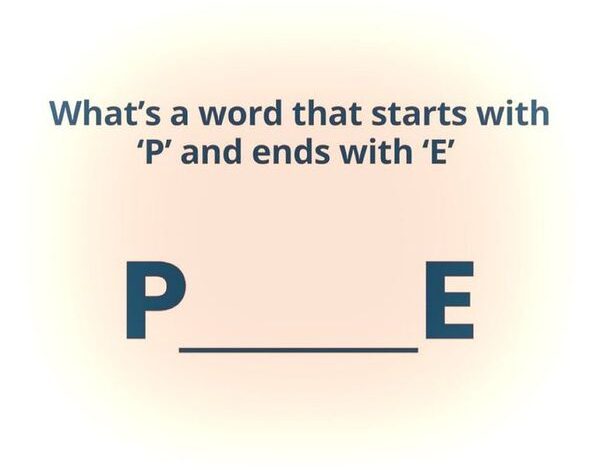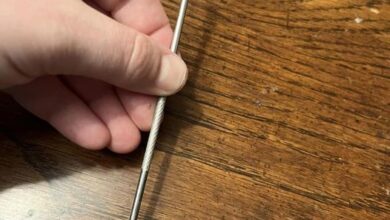**The Power of Word Puzzles: A Challenge for the Mind**

**The Power of Word Puzzles: A Challenge for the Mind**
Word puzzles have a long history of challenging people’s minds in creative and often surprising ways. Whether it’s a simple riddle or a complex crossword, these puzzles force us to think beyond the obvious, encouraging lateral thinking and a deeper appreciation for language.
The riddle posed in the image—**“What’s a word that starts with ‘P’ and ends with ‘E’?”**—is a classic example of a word puzzle that invites people to think outside the box. At first glance, it seems like a trick question. With just a few clues—a starting letter and an ending letter—the challenge is to mentally scan through our vocabulary for potential answers. The answer, quite simply, is **“Page”**.
But the puzzle doesn’t just end there. What makes word puzzles like this engaging isn’t necessarily the complexity but the satisfaction that comes from the “aha” moment when the solution becomes clear. So why do we love word puzzles, and what makes them so good for our brains?
**The Appeal of Word Games**
There’s a reason why word games and puzzles remain incredibly popular. Games like Scrabble, crossword puzzles, and word riddles have continued to entertain and educate people for centuries. Here are just a few reasons why these types of puzzles hold such universal appeal:
1. **Mental Stimulation:**
Word puzzles keep your brain active. They encourage cognitive processes such as problem-solving, memory recall, and language comprehension. Each time you engage in a word puzzle, you’re effectively giving your brain a workout, exercising important mental functions.
2. **A Sense of Achievement:**
That moment when you figure out the solution to a word puzzle—whether it’s guessing “Page” or finding the last word in a crossword—is incredibly satisfying. The sense of accomplishment that comes from successfully completing a challenge boosts dopamine levels, providing a little burst of happiness.
3. **Expanding Vocabulary:**
Word games have a unique way of introducing new words into your vocabulary. In the pursuit of finding the answer to a puzzle, we often stumble upon new terms, expanding our understanding of language in the process.
4. **Lateral Thinking:**
Not all word puzzles are straightforward. Sometimes, the solution requires lateral thinking—a problem-solving method that requires looking at a situation from a different angle. In the case of “What’s a word that starts with ‘P’ and ends with ‘E’,” the answer might not come immediately because we might be overthinking the word length or structure. But once we shift our thinking, the answer becomes clear.
5. **Accessible for All Ages:**
The beauty of word puzzles is that they appeal to people of all ages. From children learning new words to adults looking for a mental challenge, word games can be adjusted in difficulty to suit anyone
**Word Puzzles and Brain Health**
It’s no secret that brain games, including word puzzles, can have long-term benefits for mental health. Studies show that regularly engaging in puzzles can delay cognitive decline, improve memory, and even reduce the risk of conditions like dementia. Keeping the mind active and engaged, much like physical exercise for the body, helps maintain mental sharpness.
**Memory Enhancement:**
As we work through word puzzles, our brains store information about word structures, meaning, and usage. This constant engagement with language helps improve both short-term and long-term memory.
**Problem-Solving Skills:**
Figuring out a puzzle solution requires us to apply logic and think critically. This process strengthens our ability to approach problems in everyday life with a more analytical and open-minded perspective.
**Stress Relief:**
Word puzzles can also serve as a form of relaxation. While challenging, they’re often less stressful than other types of mental activities, such as competitive games or tests. Many people find word puzzles to be calming, allowing them to focus entirely on the task at hand and momentarily escape daily stressors.
**Popular Word Puzzle Variations**
1. **Crossword Puzzles:**
These classic puzzles require the player to use clues to fill in a grid with intersecting words. Each word shares letters with other words, creating a complex but enjoyable challenge that tests both vocabulary and general knowledge.
2. **Anagrams:**
In an anagram puzzle, the goal is to rearrange letters to form a different word or phrase. This type of puzzle pushes players to think creatively about how letters can be combined.
3. **Word Search:**
Word search puzzles consist of a grid of letters where certain words are hidden horizontally, vertically, or diagonally. These puzzles challenge players to find all the hidden words, often within a specific theme.
4. **Riddles:**
Much like the “What starts with ‘P’ and ends with ‘E’?” challenge, riddles use clever wordplay to stump and amuse players. The key to solving many riddles is looking beyond the obvious and considering alternate meanings or interpretations.
5. **Scrabble and Boggle:**
These classic word-building games require players to form words from random letters, testing both vocabulary and strategic thinking.
**Conclusion: The Joy of Words**
Word puzzles aren’t just fun—they’re an excellent way to challenge and develop the brain. Whether you’re tackling a simple riddle, diving into a crossword, or playing a game of Scrabble, the mental benefits are clear. Word puzzles improve vocabulary, enhance problem-solving skills, and give the brain the exercise it needs to stay sharp.
So, the next time you come across a word challenge like “What starts with ‘P’ and ends with ‘E’?”, take a moment to enjoy the puzzle. Not only will you get the satisfaction of finding the answer (like “Page”), but you’ll also be doing your brain a favor by keeping it active and engaged.
Let me know if you’d like to add more details or specific aspects to the article!




